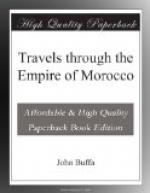LETTER VIII.
Tetuan—The Jews much oppressed there—particularly the Females—Costume—Singularity of the Streets in the Jewish Town—Ceuta—Would be invaluable to England—Melilla—Summoned to visit the Emperor.
Tetuan, —— 1806.
There is little that is remarkable in this town, beside what I mentioned in my last. It is distant twenty miles from Ceuta, a Spanish fortress, and twelve from the Mediterranean, and is nearly opposite to the rock of Gibraltar. It has a good trade, and contains about eighty thousand inhabitants, twenty thousand of which are Jews, said to be very rich. The Jews are tolerably civilized in their manners, but are dreadfully oppressed by the Moors. Seldom a day passes but some gross outrage or violence is offered to the Jewish women, the generality of whom are very handsome, though their dress is by no means calculated to set off, but rather to detract from, their beauty.
Men, women, and children, still preserve the same costume as in the time of Moses. You cannot conceive any thing more ridiculous than the tout ensemble of a Barbary Jewess in full dress. Every part of her apparel is rich, but is so heavy, that, to an European, nothing can appear more awkward and unbecoming. The Jewish ladies wear immense ear-rings. I have observed several full twelve inches in circumference, and of a proportionate thickness; and a few ornaments being affixed to the ear-ring, I leave you to judge what materials their ears must be made of, to bear such a weighty appendage.
The Jewish town is quite distinct from that of the Moors; but the difference between them is very little: the streets are equally narrow and dirty, and the houses have no windows on the outside; the roofs are also quite flat; the only variation is, that the streets are covered with a roof extending from the houses on each side, and have the appearance of subterraneous passages. There is a regular communication between the houses at the top, which is the favourite scene of recreation. Some of the women scarcely ever take the air, excepting on these flat roofs: in short, the inhabitants, both Jews and Moors, dance, sing, and take all their amusements on them. The rooms of the Jewish houses (as well as of the Moors) are long, narrow, and lofty, resembling galleries. Most of the houses are occupied by several families, which are generally large. Those inhabited by the more opulent are kept tolerably neat, and are adorned with rich and curious furniture; but they are, for the most part, exceedingly dirty; and the exhalations from the garlic and oil, which they use in great quantities in frying their fish, are enough to suffocate a person not entirely divested of the sense of smelling. Their taste is so exquisitely refined, in regard to the oil they use, that they prefer our lamp-oil to any other, on account of its high flavour.




